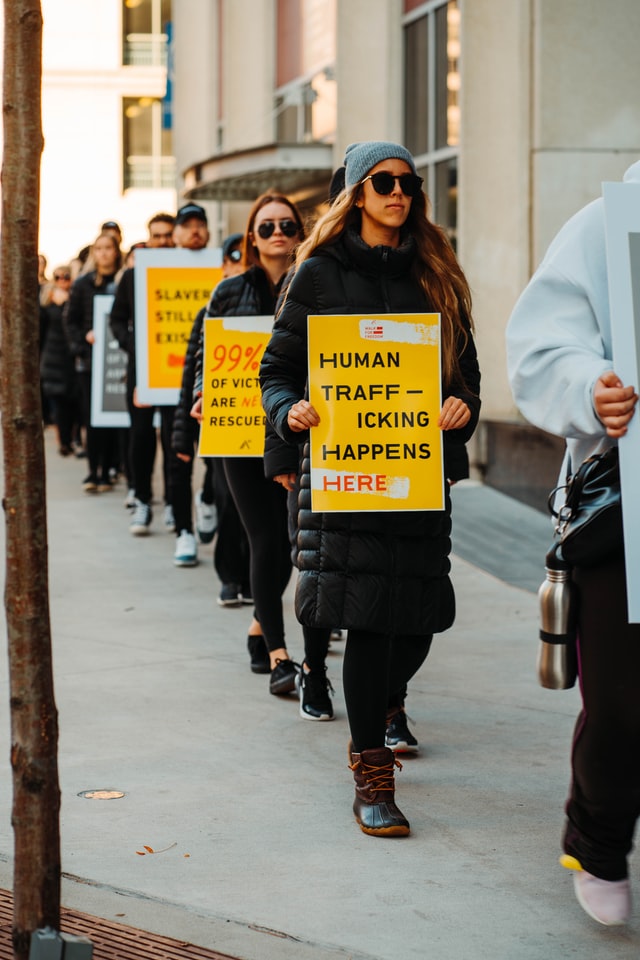By Harry Van Buren, Judith Schrempf-Stirling, & Michelle Westermann-Behaylo
Human trafficking, far from being an artifact of the past, is very much part of the present. The International Labour Organization estimates more than 40 million people are currently trafficked for the purposes of exploiting their labor in industries as diverse as chocolate, fishing, hospitality, and mining. Victims of human trafficking include children and adults induced to work through force, fraud, or coercion.

Everyone agrees, at least publicly, that human trafficking is entirely evil – yet it persists and many actors contribute to its existence. In seeking efficiency in global supply chains, many businesses contribute to the exploitation of people working in labor supply chains in response to demands for cost cutting, reduced liability of lead firms, and flexible work orders. In our Business & Society article Business and Human Trafficking: A Social Connection and Political Responsibility Model, published as part of the journal’s special issue on “Modern Slavery in Business: Interdisciplinary Perspectives on the ‘Shadow Economy,’” we address the ethical responsibilities of businesses related to human trafficking.
Because the demand for trafficked labor is sustained by business strategies that provide incentives throughout global supply chains to sub-contract further to reduce labor costs, a common response from regulators and civil-society actors has been to impose due diligence obligations. These often translate into efforts to monitor supply chains to detect and prevent human and labor rights violations through audits that are based on voluntary supplier codes of conduct. However, due diligence is often criticized for focusing mostly on first-tier suppliers while human trafficking often occurs further down in supply chains – beyond the reach of most existing ethics auditing systems (LeBaron, 2014; Phillips & Mieres, 2015) – meaning that due diligence often becomes a tool for “cosmetic compliance” (Nolan & Bott, 2018, p. 3).
What, then, is a more fruitful approach to combatting human trafficking and corporate connections to it? We argue that due diligence, important as it is in raising consciousness of the problem of human trafficking, is insufficient because human trafficking is a structural injustice. According to Young (2006: 114), structural injustices occur when “social processes put large categories of persons under a systematic threat of domination or deprivation of the means to develop and exercise their capacities, at the same time as these processes enable others to dominate or have a wide range of opportunities for developing and exercising their capacities.” Because human trafficking is a structural injustice, no one person or business creates it, but contributes to it through individual actions. From this social connection follows that everyone who is in a position to contribute to ending it has an ethical obligation to do so. This is why due diligence is an inadequate response to human trafficking: due diligence seeks to adapt existing business practices when firms should be instead asking whether those practices are causes of human trafficking in some way and then changing them if they are. The kinds of changes that are useful in this regard include making commitments to strengthen collective bargaining and freedom of association rights, ensuring that price negotiations with suppliers are not so aggressive as to make it impossible for them to pay living wages to employees, and collaborating with peer companies to address systemic issues.
Our social connection and political responsibility model posits that businesses can adopt one of four pathways to address human trafficking based on (1) whether a firm has a strong or a weak connection to human trafficking and (2) whether their collective ability (i.e., how easily and how effectively firms can work together to address human trafficking) is high or low:
- vertical integration through acquiring suppliers (strong connection, low collective ability),
- supplier partnerships that seek to develop long-term relationships and to empower workers (strong connection, high collective ability),
- detection and signaling such as training workers to recognize signs of human trafficking, as UPS does (weak connection, low collective ability), or
- cross-industry partnerships such as the Global Business Coalition Against Trafficking, which seeks reform of labor laws to reduce the demand for trafficked labor (weak connection, high collective ability).
Our pathways show that any kind of firm with any type of connection to human trafficking can take responsibility for human trafficking in some way, and in so doing help to contribute to its elimination from the modern economy.
References
LeBaron, G. 2014. Reconceptualizing debt bondage: Debt as a class-based form of labor discipline. Critical Sociology, 40: 763-780.
Nolan, J., & Bott, G. 2018. Global supply chains and human rights: Spotlight on forced labour and modern slavery practices. Australian Journal of Human Rights, 24: 44-69.
Phillips, N., & Mieres, F. 2015. The governance of forced labour in the global economy. Globalizations, 12: 244-260.
Van Buren III, H. J., Schrempf-Stirling, J., & Westermann-Behaylo, M. 2021. Business and human trafficking: A social connection and political responsibility model. Business & Society, 60: 341-375.
Young, I. M. 2006. Responsibility and global justice: A social connection model. Social Philosophy and Policy, 23: 102-130.
